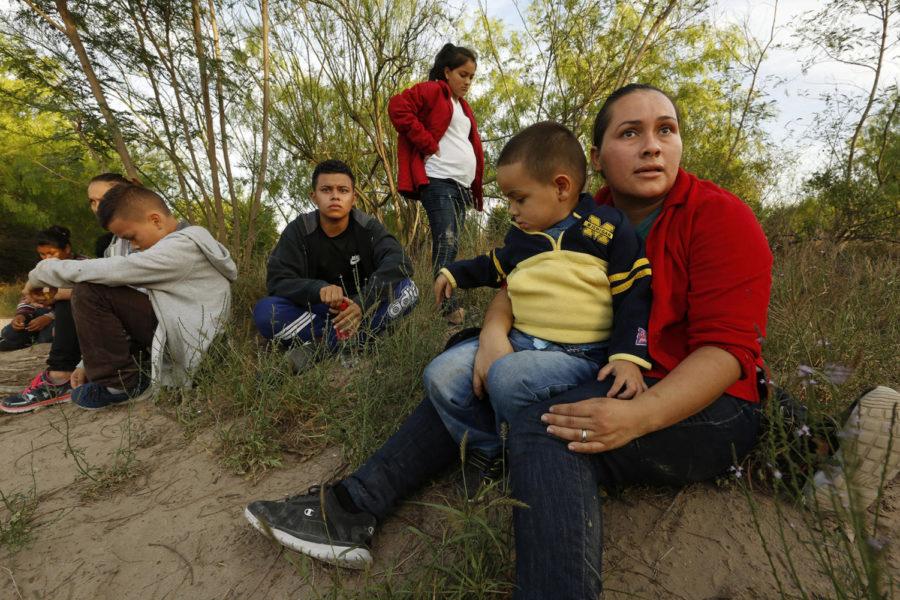Family separation blasted by both parties at oversight hearing
Carolyn Cole/Los Angeles Times/TNS
Hayti Alvarado, 26, holds her son Esteban Alvarado, 3, along with her daughter Gabriella Alvarado, 11, (not shown) after being detained near the Rio Grande River. The Alvarado family had to flee their country after Gabriella was threatened at school. A report suggests thousands more children were separated from their families by the Trump administration than previously disclosed.
February 8, 2019
Democrats on a House subcommittee demanded answers Thursday from Health and Human Services officials regarding how many children were actually separated from parents during the “zero tolerance” policy last spring at the southern border, after a report found that thousands more children could have been separated than the 2,700 previously reported.
“What’s been happening is more than irresponsible and sloppy. I think what we’re really talking about is state-sponsored child abuse, and I would go as far as to say kidnapping,” Rep. Jan Schakowsky, D-Ill., said at a hearing by the House Energy and Commerce subcommittee on Oversight and Investigations.
Many Democrats demanded to know whether HHS, which takes custody of the children after the Border Patrol arrests parents trying to cross the border, played a role in the policy, which was implemented last April by an executive order from President Donald Trump. “We need to know what role HHS leaders played in formulating this policy, whether they made any effort to stop it and whether they raised any concerns about the harm it would do to the children who were separated. There is no evidence that HHS ever tried to stop this abhorrent policy,” said subcommittee Chairwoman Diana DeGette, D-Colo.
This was the first hearing by the newly held House Democratic majority on family separations, setting the tone on how Democrats will carry out oversight of the Trump administration’s immigration policy. The hearing comes after a January report by the HHS inspector general, who concluded that thousands more children could have been separated than previously reported and that there was probably no way to know how many.
Cmdr. Jonathan White of the U.S. Public Health Service said HHS played no role in implementing the policy.
The policy, announced in early April 2018 by then-Attorney General Jeff Sessions, was to intercept, arrest and prosecute all migrant families trying to enter the United States. After public outcry, Trump rescinded the order June 20, and a court later ordered the government to reunite parents and children.
“No one in HHS separated a single child from their parents,” White said, explaining that his department’s role was only to house and feed the children while other agencies carried out immigration legal proceedings. “We have the ability and have pursued reunification for every child in (the Office of Refugee Resettlement’s) care,” he said.
White said he did not take part in conversations on how to implement the policy. No one from the departments of Justice or Homeland Security testified.
The January IG report concluded that officials did not properly track how many children were actually separated. The report also found that from July 1 to Nov. 7, the Office of Refugee Resettlement received at least 118 children who DHS identified as separated from their parents after the policy was officially ended.
There are still 93 children in government custody who were separated from their parents at the border, according to a joint status report issued in February 2019.
Rep. Nanette Barragan, D-Calif., called the IG report “devastating.”
“Not just because they pretty much lied to Congress, but they were withholding information from us. I think that anytime that you are going to separate parents and their children, you need to have a tracking system so that you are able to reunite them and know where they are,” she said.
Republicans shared Democrats’ concerns about transparency between the Trump administration and Congress.
“I want to be clear I support strong enforcement at our nation’s borders, but I do not support separating children from their parents between the violence they face in their home country and on their harrowing journeys to the U.S.,” said Rep. Brett Guthrie, R-Ky., ranking member of the subcommittee.
Rep. Susan W. Brooks, R-Ind., who said she also opposed the policy, recommended that HHS give weekly updates to the committee on the number of children in Office of Refugee Resettlement care who were separated from their parents.
Andrew Free, an immigration attorney who represents a family that was separated at the U.S.-Mexico border during the zero tolerance policy, alleged that the government is still separating families “on a smaller scale.”
“It’s unsurprising to me that there could be thousands of children and parents that were additionally separated because that is what was set up to do,” he said. “This regime has systematically dismantled the protections of vulnerable people that arrive at the border. We have to be clear-eyed on that.”
Even though none of his clients has been deported, he said they are still coping with the trauma resulting from being separated from their children for more than five weeks.
Many health experts have written letters to Congress contending that those affected by the policy will suffer irreparable trauma.
“Unwanted and unexpected separation from parents may have severe consequences in a child’s developmental processes and psycho-social functioning,” Cristina Muniz de la Pena of the Center for Child Health and Resiliency in New York, said at the hearing. “The intense fear, sense of helplessness and vulnerability for the child associated with forced separation from their parent can lead to a state of hyper-arousal, attention deficits, depressive symptoms, and interference in their ability to communicate and relate to others.”








